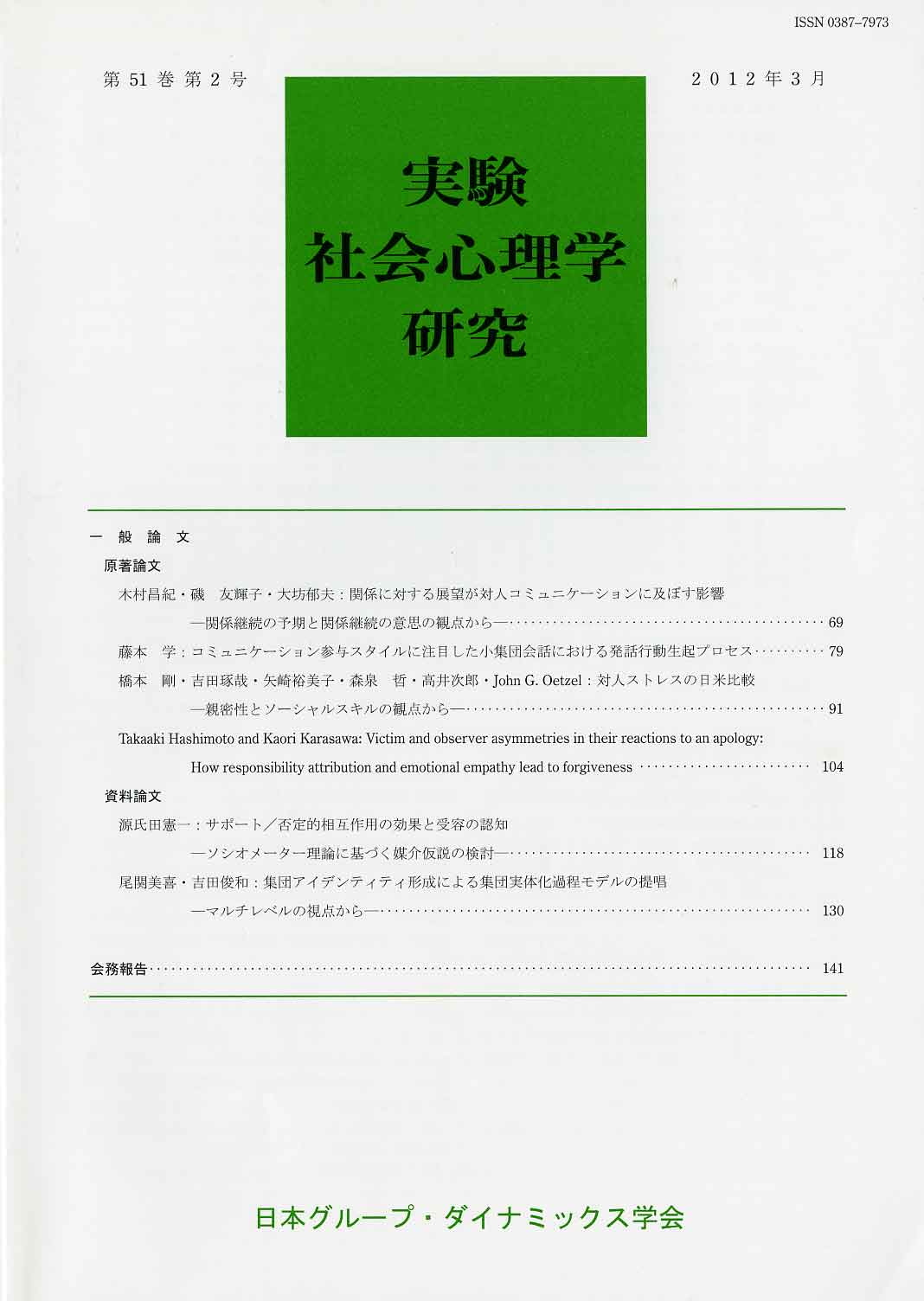
- Issue 2 Pages 37-
- Issue 1 Pages 1-
- Issue Supplement
- |<
- <
- 1
- >
- >|
-
Ryota Yorimasa, Takumi MiyamotoArticle type: Review
2022 Volume 61 Issue 2 Pages 37-56
Published: 2022
Released on J-STAGE: April 28, 2022
Advance online publication: November 26, 2021JOURNAL FREE ACCESSThere are two types of disaster relief volunteer center: those established by public agencies and those established by the private sector. During disasters, organizations can be divided into those run according to a command and control (C&C) model and those run according to an improvisational and autonomous model. After the Great Hanshin Earthquake, public disaster relief volunteer centers were unified under a C&C model, which generated conflict with private organizations. The diversity of volunteers reduced due to the “drive for orderliness” created by the C&C model. In this study, we performed a detailed case study of the disaster relief volunteer centers established after the Great Hanshin-Awaji Earthquake. As a result, it became clear that management and control systems were developed to deal with two factors: the positive effects of volunteers helping each other, and the negative effects of volunteers being strangers. Moreover, we found that the ambivalence of volunteers was responsible for the differentiation and conflict between public and private organizations. Finally, we show that it is possible to overcome this differentiation and conflict by having a combination of public and private disaster volunteer centers involving a variety of actors.
View full abstractDownload PDF (610K)
-
Hiroshi Nonami, Go Sakamoto, Shoji Ohtomo, Yutaka Tashiro, Toshiaki Ao ...Article type: Original Article
2022 Volume 61 Issue 2 Pages 57-70
Published: 2022
Released on J-STAGE: April 28, 2022
Advance online publication: November 11, 2021JOURNAL FREE ACCESS
Supplementary materialThe superior legitimization of a concerned party is defined as the tendency of people to consider that concerned parties (e.g., local residents) have superior rights to other actors (e.g., administrations) to decide the locations of public facilities and is associated with the NIMBY problem. It undermines total social benefits by inducing concerned parties to reject NIMBY facilities. The maximin principle and moral judgments are hypothesized to determine this tendency. An experiment using a vignette regarding a high-level radioactive waste storage facility was conducted in a 2×2 design; namely, group (in- vs. out-group) × concerned party (statistical vs. identifiable lives). The superior legitimization of the concerned party was indicated not only in the in-group, but also in the out-group, among whom the maximin principle was not aroused. It was more salient in the in-group when an identified life was presented as the concerned party. The path from the individualizing moral foundation toward the legitimacy of the concerned party was notable in the in-group. Moral studies of NIMBY problems can be expected to result in further theoretical development.
View full abstractDownload PDF (596K)
-
Yudai Suzuki, Itsuki Yamakawa, Shinji SakamotoArticle type: Short Article
2022 Volume 61 Issue 2 Pages 71-80
Published: 2022
Released on J-STAGE: April 28, 2022
Advance online publication: March 16, 2022JOURNAL FREE ACCESSThis study examines the effects of perceived affective perspective-taking (i.e., believing that another individual is taking one’s perspective and imagining one’s emotion) and perceived cognitive perspective-taking (i.e., believing that another individual is taking one’s perspective and imagining one’s thought) on perceived empathy. First, participants wrote an essay about their opinion. Then, they received feedback as to whether another participant (who does not actually exist) who read their opinion took their perspective and imagined their emotions and thoughts. Our data suggest that perceived empathy is facilitated in what is a relative effect of perceived affective perspective-taking and perceived cognitive perspective-taking. Moreover, it is suggested that perceived affective perspective-taking has an absolute effect on perceived empathy. Regarding the results, we considered the possibility of covariation between perceived affective perspective-taking and perceived cognitive perspective-taking.
View full abstractDownload PDF (297K)
-
Miki Ozeki, Giovanni A. TravaglinoArticle type: Short Note
2022 Volume 61 Issue 2 Pages 81-86
Published: 2022
Released on J-STAGE: April 28, 2022
Advance online publication: April 13, 2022JOURNAL FREE ACCESS
Supplementary materialGroup-norm succession motivation refers to motivations for passing down group norms to the younger generation. The current study compared the effects of group identity and individualism/collectivism on group-norm succession motivation between Japan and the UK. Eighty-four university students from Japan and 132 university students from the UK were included in the analysis. The results showed that group identity positively influenced group-norm succession motivation in both Japan and the UK. Group-norm succession motivation seems to be promoted by the following two routes: responsibility for the younger generation and hoping they experience happiness and showing superiority over the younger generation.
View full abstractDownload PDF (277K)
- |<
- <
- 1
- >
- >|